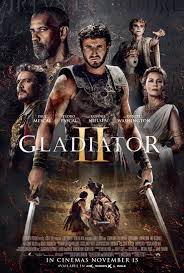
Years ago, when I first heard that there would be a sequel to Gladiator, a film that won Best Picture and is one of the greatest films of this century’s first decade, my initial thought was, “Why?” Why do they feel the need to make a sequel to a film that had a closed and satisfying ending, was fully self-contained, and had been released two decades ago? Now, here we are, 24 years after the first one came out, and finally getting a sequel. I always have a bit of trepidation when a sequel comes out a decade or two rather than a year or two after the original. Would it be able to capture that same magic? Would too much time have passed making the idea now seem stale? The answer to both of those questions is yes and no.
I found Gladiator II to be very much a mixed bag. The plot bothered me, and I felt I was only truly engaged for about twenty or thirty minutes around the transition from Act II to Act III. A lot of great character and story moments were revealed during that stretch, and I found myself feeling entertained and emotionally impacted by what was going on. But most of the rest of the movie felt like a rehashing of the first one. They were trying to do the same thing, but more. Instead of tigers chained in the arena, they had to fight baboons. Instead of one psychopathic emperor, there were two. Instead of Lucilla (Connie Nelson) being in love with the gladiator, Lucius (Paul Mescal), he was now her son.
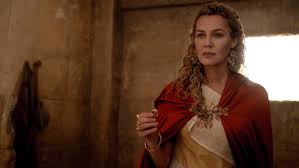
It’s that plot component that bothered me the most. Not that Lucius was her son, but how they handled it from a storytelling standpoint. We are shown that Lucilla ushered Lucius out of the Colosseum immediately after Maximus killed Commodus and also died from his wounds. Fearing that he was now the heir to the throne, she sent him into hiding and never saw him again. I’m not going to get into all of it, but there was a whole lot of confusion over who he was, how he felt about Rome, and how he felt about his mother. He seemed to be bitter toward all of it before suddenly turning, and I just didn’t buy it.
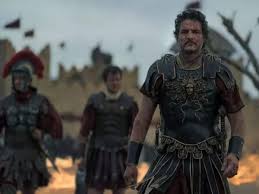
My main critique of the story is that, until we get to the end of the second act, is that it’s disorganized and confused. There is a solid structure to the story, and it’s clear who we’re rooting for, but the motivations of Lucius and General Marcus Acasius (Pedro Pascal) seem very confused. Pascal actually did a good job of bringing Acasius’ ambiguity about expanding the empire simply to suit the egos of twin emperors Geta and Caracalla. Another thing the movie doesn’t explain is how the two of them came to power. But that’s a whole other kettle of fish. Like Maximus in the first movie, we see Acasius win a glorious victory at the beginning of the film, but his glory is tempered by the real-world consequences of the blood he had a hand in spilling. He’s tired of it and believes Rome needs new leadership.
So, like in the first movie, he has his troops outside the city, ready to come in and overthrow the emperors. However, like in the first movie, they get wind of the plot before it can be consummated and bring their wrath on the conspirators.
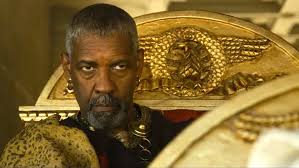
One thing that Director Ridley Scott did differently is the brilliant addition of Denzel Washington as the slave trader Macrinus. Unlike Oliver Reed’s Proximo, Macrinus has more devious plans in mind than just making money off of the gruesome deaths of others. He has revenge on his mind, and he wants to change the entire political order of Rome. Washington played this character with terrific charm and sinister villainy and kind of stole the show. He was absolutely the most interesting character in the film.
Otherwise, I felt a lot of the acting was subpar, which was disappointing. The acting in the first Gladiator is fantastic, but outside of Washington and perhaps Pascal, the other actors didn’t bring their A-games. Or maybe they did, and it just wasn’t good enough. Mescal was particularly flat in his performance, and Nelson, reprising her role from nearly a quarter century ago, didn’t seem all that interested in being there.
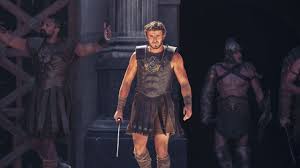
After reflecting on the movie overnight, I will say that there is a lot of great stuff going on thematically. In the ultimate answer to my question of why this movie was made at all, and specifically why it was made now, I have my answer. It was made to make us look in the mirror. Rome in Gladiator was still a majestic empire. The city was clean, the population happy, and the society was prosperous despite the fact that they were living under a dictatorship. The Rome of Gladiator II exists sixteen years after the events of the first movie and is clearly a society in decline. Poverty ravages the population while the elite conduct wars and conduct games in the Colosseum. Homeless people beg for food, and society is constantly teetering on the verge of unrest and revolt.
It’s impossible to watch this movie and not consider it to be a parable for what is happening in the United States and several other democracies around the world. Our nations seem more and more to be led by people who are more concerned with maintaining their grip on power than sharing prosperity with their citizens. Gladiator II is holding a mirror in front of us, warning us that we are heading down a path to a much worse place than where we currently reside.
I tried like hell to watch this movie with an open mind. Gladiator is a film that I love, and I knew this one would have a hard time measuring up to it. Despite my best efforts, I was unable to enjoy Gladiator II as much as I could have if I had been able to get the first movie out of my head. But that’s what sequels do. For better or worse, they invite comparison to their predecessors. I do believe that the strong thematic components come close to saving Gladiator II and making it a better film than it had a right to be, but I will always defer to the first one. I could see myself watching it again many more times. I do not see myself revisiting Gladiator II any time soon.